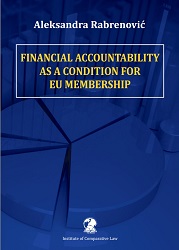
We kindly inform you that, as long as the subject affiliation of our 300.000+ articles is in progress, you might get unsufficient or no results on your third level or second level search. In this case, please broaden your search criteria.

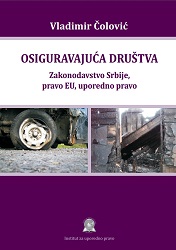
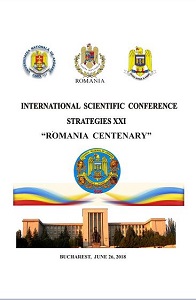
Political leaders in the European Union are confronted with a complex issue. Citizens want the authorities to find solutions to the major problems they face, but they do not trust EU institutions and policies. This situation, recognized by national parliaments and governments, is particularly acute at the level of the European Union. There is mistrust that a complex political-administrative system can apply viable, successful policies. Citizens want the European Union to be the first to take advantage of globalization opportunities in terms of economic development and to respond to the challenges of the environment, unemployment, food security, crime and regional conflicts. The Union must act as transparent as national governments. Democratic institutions and citizens' representatives, both at national and European level, have a duty to ensure respect for European Union law. This is the initial condition for the development of effective and relevant policies. The development of a legal and administrative system for the protection of human rights in the European Union's administrative space is a major objective for the EU institutions.
More...
This book aims at studying the evolution of the internal market of the European Union, analyzing how to harmonize the national laws of the Member States on the free movement of goods, persons, services and capital and then proposing to increase administrative convergence between Member State administrations, from the desire to increase the degree of integration and interconnection of states within the single market. This research carried out contributes to the opening of new research directions in the field of European Union law: regulating the convergence between the economies of the European Union states that make up the European Economic Area; interdisciplinarity in the study of the European Union. The book contributes to the development of sub-issues of European Union law - the Law of the internal market of the European Union, which until now has not received any particular attention from the doctrine, although practice has shown that there are many problems that call for in-depth research to provide solutions to increase efficiency in the functioning of the single market.
More...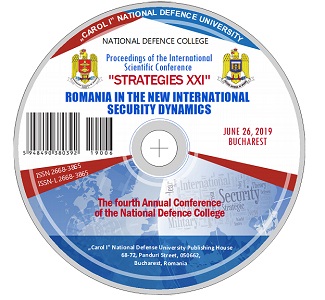
It is important to communicate to the public at large that security and defense ‘matters’ now, and that it will matter to their future prosperity, even if our citizens do not necessarily see an immediate external security threat. Heads of State and Government are uniquely placed to pass this message to a wider public, and we should not miss that occasion. Preparations for the European Council discussion have already provided an opportunity to raise the visibility of CSDP in general. The EEAS, in collaboration with the General Secretariat of the Council and the Commission, is working on a specific communication campaign. This needs to be linked to the communication efforts of the Member States. However, further analysis of our target audiences, messages, and tools is necessary to improve CSDP’s visibility in a sustainable way. A targeted Eurobarometer survey on Security and Defence could contribute to this analysis.
More...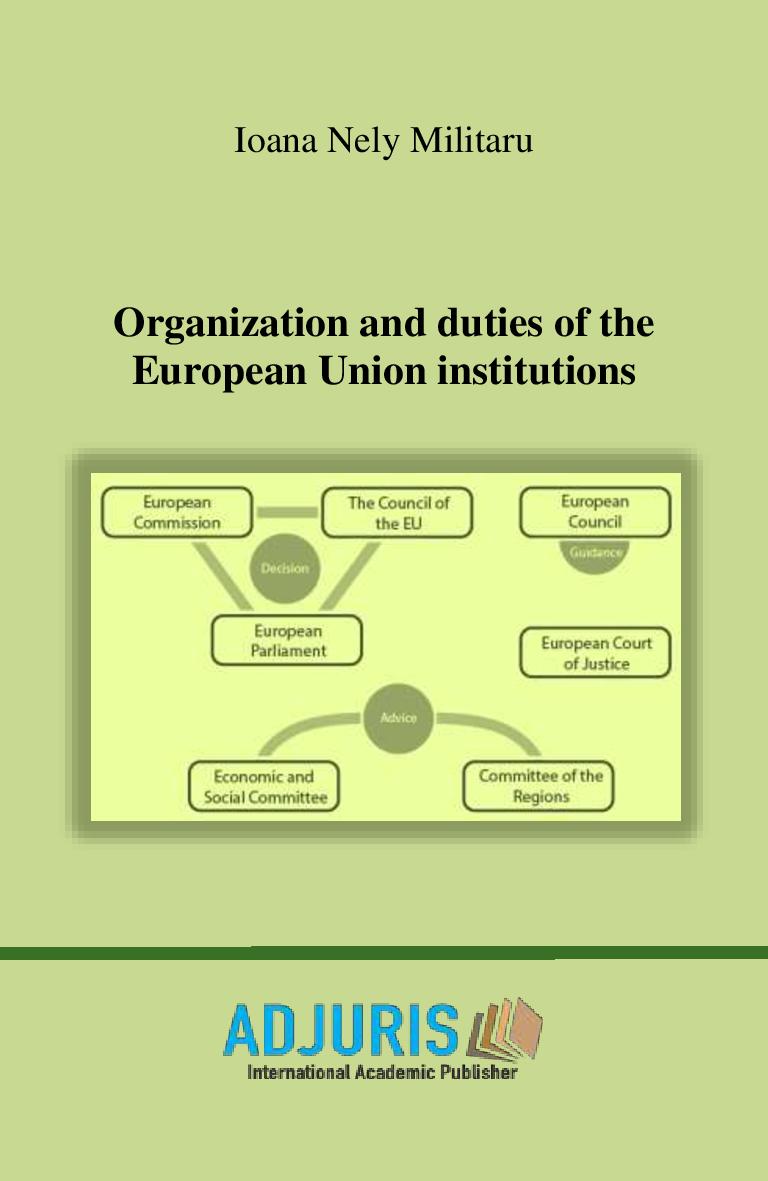
The European Union has a unique institutional framework aimed at promoting its values, pursuing its objectives and supporting its interests, its citizens and Member States, as well as ensuring the coherence, effectiveness and continuity of its policies and actions. The first Community institutions were created by the Treaty establishing the Coal and Steel Economic Community (from 1952, which established the coal and steel market), respectively the Treaty establishing the European Atomic Energy Community (from 1958, which established a generalized European common market). to the entire economy and to the field of atomic energy). Each treaty subsequent to the institutional treaties of the European Communities has contributed to the development of community institutions and the elimination of trade barriers between Member States with the aim of increasing economic prosperity and contributing to a "deeper union between the nations of Europe".
More...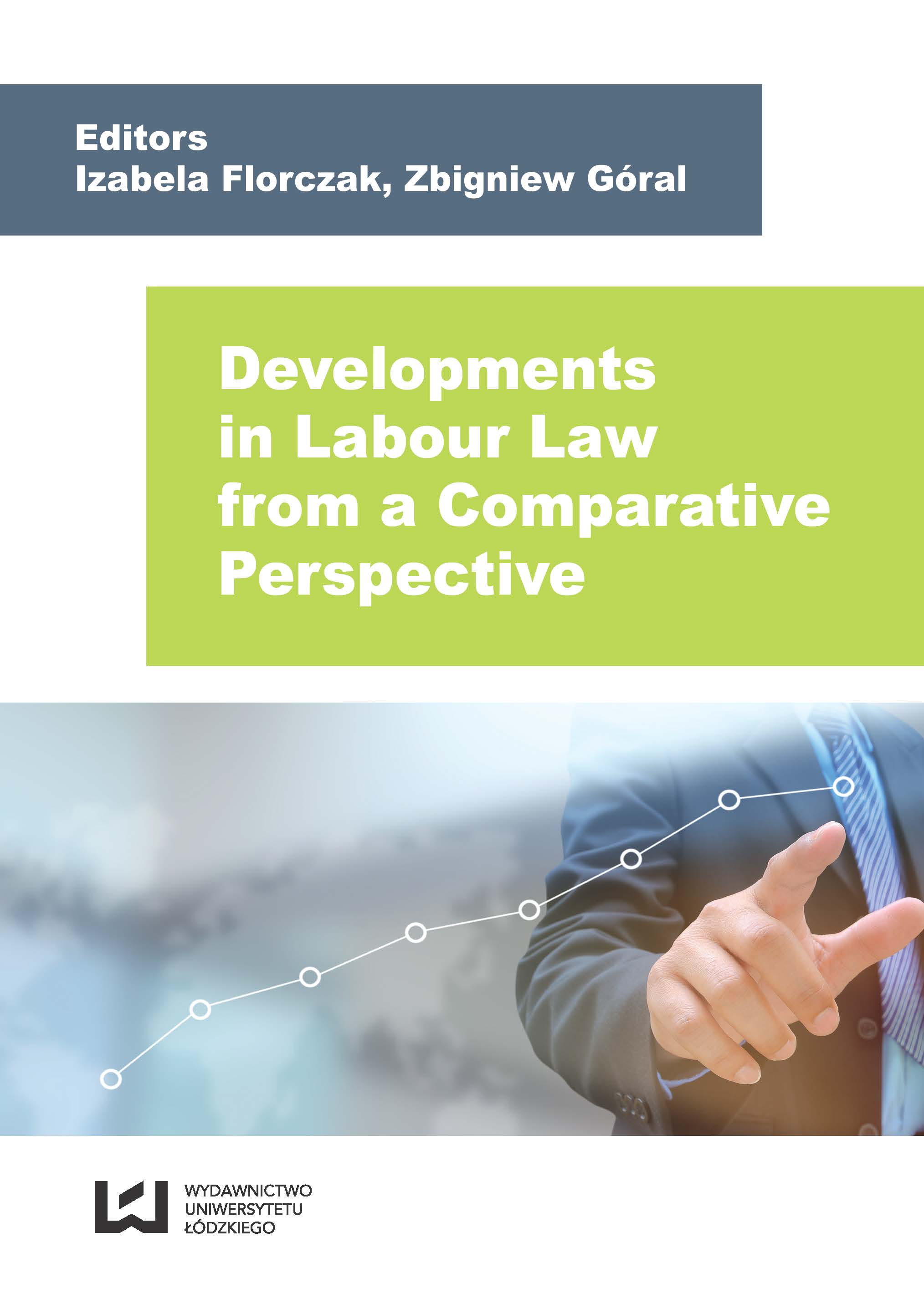
The need for comparative studies of labour law seems indisputable, inasmuch it arises from the international character of many labour law norms, as well as from the interconnection between working and social relations which are often conditional and international. Thus, it appears that academic research into the field of labour law would be incomplete without its comparative facet. For these reasons, numerous networks of international cooperation between labour law scholars are being established on both formal and informal levels. The underlying idea is to find a common denominator for the discourse concerning the present condition of labour law, and pathways for its further development. The Labour Law Education Society, established in 2012 at the initiative of Prof. Charles F. X. Szymanski, is one of the networks attempting to accomplish this objective. Its early days were crowned with Developments in Labour Law from a Comparative Perspective, a conference held on 23rd–24th of May 2014 at the AllerhandInstituteʼs branch in Cracow, Poland. The present volume, which is an outgrowth of that conference, presents certain current issues frequently discussed in the realm of labour law. Also, it contains chapters considering the most significant developments within the discipline.
More...
Many suspects and accused persons have intellectual or psychosocial impairments that, if not identified on time, may affect their ability to effectively and fairly participate in the criminal proceedings. Unlike age and physical illness, which are easily recognised, intellectual and psychosocial disabilities are not always visible and may remain unnoticed or misinterpreted. While some people may inform the criminal justice authorities of their disability, others may not be aware of their condition or try to hide it to avoid stigmatisation and intimidation. This manual is designed to provide criminal justice practitioners with practical guidelines on how to identify and communicate with suspects and accused persons with intellectual and psychosocial impairments considering their vulnerable situation and respecting their rights.
More...
In recent years, cases of labour exploitation in supply/subcontracting chains have been uncovered around the world, as well as in Europe. Outsourcing of work or services through subcontractors/suppliers or use of temporary workers in flexible employment relationships heighten the risk of exploitative working conditions. The working conditions in lengthy subcontracting chains might be difficult for companies to uncover. Everything may seem legal on paper but in reality, exploited migrant workers might work long hours in poor conditions, which are below national standards, and they have little or no possibility to change their situation. To protect the rights of migrant workers, to promote fair competition and decent work, as well as to avoid negative publicity businesses have a responsibility to address the risk of labour exploitation and human trafficking in their subcontracting or supply chains. This risk management toolkit has been developed with the purpose to give companies a brief overview of what labour exploitation and trafficking are, as well as to demonstrate the risks for businesses, and how involvement in such scenarios can be effectively avoided.
More...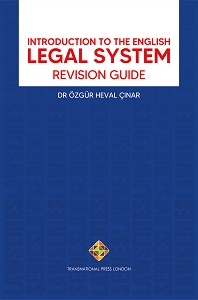
The real reason for the emergence of this book is that it is hard to find resources to explain complex issues of the EU Law in plain language, which makes it very difficult for those taking an interest, in particular law students. Moreover, many years of teaching experience in this subject and seeing students experience difficulties is the key driver behind this book. This book does not repeat material that is available in many textbooks that are in print. Rather, it endeavours to present every topic in plain language and concludes every chapter with a fictitious explanatory sample case. In other words, it is an introduction to the subject of EU Law, the objective of which is to explain the topic both theoretically and in its application dimension. Additionally, this book will assist students to prepare for courseworks/examinations. At the end of the book there is also a test that summarizes all the subjects contained in the book, which is appropriate to the first stage SQE (Solicitors Qualifying Examination) examination model that will be introduced in September 2021.
More...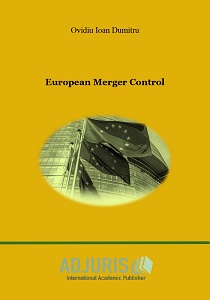
Modern European Merger Control Policy is the result of a compelling evolution as, throughout the course of time, the underlying objectives guiding its enforcement have been influenced by different school of thoughts, decisions of the bodies supervising the competition, Commission at EU level and national authorities at the state level, and, of course, the economic evolution of the continent. As a consequence, the European institutions together with the Member States had to amend the initial provisions from the Treaty and, later, from the specific Regulation. This book aims at studying the evolution of the European Merger Control rules, from the founding treaties till the last European act providing it, in parallel, analysing the caselaw in the field and its influence in the reformation process. The final Reform of the European Merger Control was implemented in 2004, as a consequence of globalization and rapid developments of the markets, including the digital economy, as some amendments were essential for a competitive and innovative European single market, leaving us with a amended procedure which is presented in the present book.
More...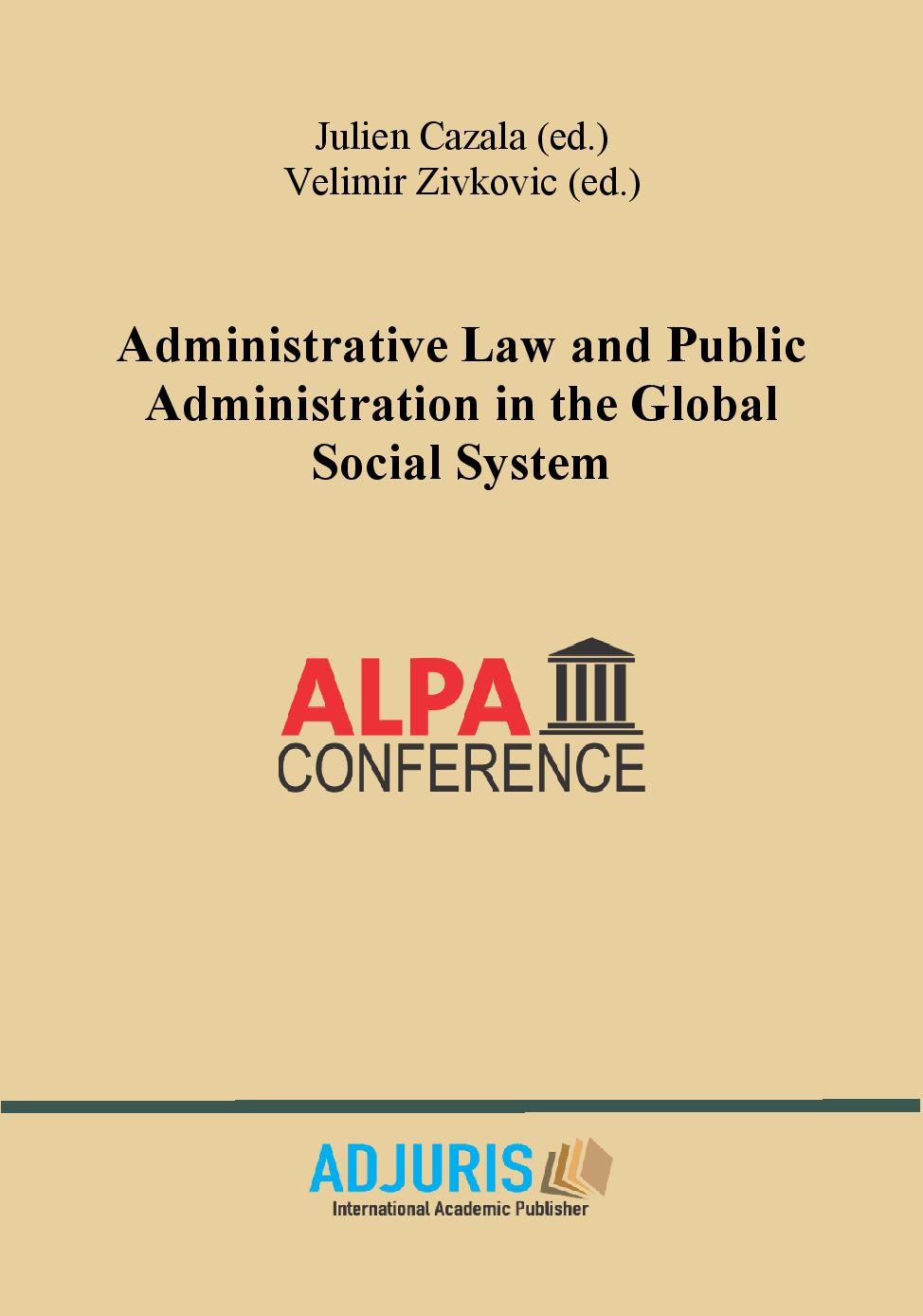
In recent years, numerous irregularities have been found within organizations, respectively enterprises, in the public and private sectors. These irregularities are capable of seriously harming the public and private interests, respectively, in the medium and long term. In order to prevent possible irregularities, it was necessary to guarantee the protection of whistleblowers, given that their identity is made public. In order to strengthen the protection of whistleblowers at European Union level, the Commission proposes a directive on the protection of persons reporting infringements of European Union law. The Commission's approach is based on the case law of the European Court of Human Rights on the right to freedom of expression and the 2014 Council of Europe Recommendation on the protection of whistleblowers.
More...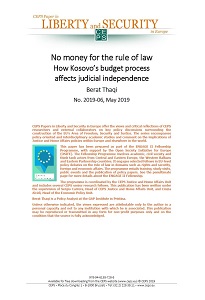
With its “credible enlargement perspective for and enhanced EU enlargement with the Western Balkans”, the EU plans to launch several new flagship initiatives for the six aspiring countries. The key initiative envisaged is “to strengthen rule of law” through more detailed assessment of the rule of law and reform implementation by including case-based peer reviews, trial monitoring of serious corruption cases and organised crime, developing indicators for reform implementation and deploying advisory missions. // The EU has begun some planning but detailed action plans are yet to come. New programmes and initiatives should be new in content and form. In the case of Kosovo, things are more complex; the clarity of the new plan and drawing the line between the past and future is key for any success of the upcoming initiatives. With EULEX still on the ground, after 10 years of deployment, plagued by low trust and an image of failure, the rule of law has little improved in Kosovo. The EU should carefully consider the conditions upon which new initiatives are established. // Equally, local authorities need to be fully in the driving seat. Reluctant to do so until now, the government has recently initiated a Functional Review of the Rule of Law Sector and Justice 2020. Their agendas have not progressed much in the absence of political will, and undefined roles and agendas remain between the local authorities and EU. Any new initiatives should be launched based on certain principles that ensure they have full local ownership, are driven by local demand, are based on in-depth evaluation and verification, build upon broad consultations and inclusion, have a clearly defined role and scope, have realistic expectations and contribute to streamlining the reform agendas.
More...
This monograph is a unique, in-depth and comprehensive analysis of the laws that regulate the energy sector in Ukraine as they relate to energy sector regulation of the European Union. This work addresses the contemporary understanding of the concept of sectoral regulation and determines goals (values) and specific legal means (instruments) of regulatory intervention in both, Ukraine and the EU. The author starts with distinguishing the four basic goals of the regulation of the energy sector. The first goal is to implement and support broadly understood principles of economy. The second goal pertains to a broadly understood protection of the interests of consumers (household consumers, including vulnerable consumers) and their social welfare (social goals of regulations). The third goal is to guarantee energy security, and the fourth goal highlights environmental protection and climate action (pro-ecological objectives). The analysis uses the above concepts to assess the regulatory regimes for electricity and natural gas sectors in Ukraine and the EU. The findings indicate that the EU regulation of electricity and natural gas sector recognizes all the relevant regulatory goals. While legal measures (instruments) for the implementation of all important regulatory objectives have been introduced and legally guaranteed in Ukraine, the actual application and implementation of the laws leaves room for improvement.
More...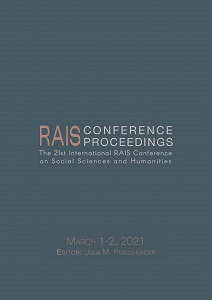
This material presents an analysis of the control exercised by the courts over insolvency practitioners for the conduct of insolvency proceedings. Depending on the legal systems and the choice of the legislator, the Member States of the European Union have chosen differently on the way of how the court intervenes in the conduct of insolvency proceedings. Thus, there are opinions according to which the insolvency procedure must be carried out entirely outside the court, but also opinions according to which the court must have a significant control within the insolvency procedure. The Romanian legislator combined the two opinions, totally opposite, establishing that the court, through judges specialized in insolvency, should have legal control over the conduct of insolvency proceedings, and only in cases expressly provided by law, to exercise control over opportunity.
More...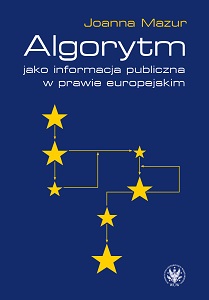
The author verifies the hypothesis concerning the possibility of using algorithms – applied in automated decision making in public sector – as information which is subject to the law governing the right to access information or the right to access official documents in European law. She discusses problems caused by the approach to these laws in the European Union, as well as lack of conformity of the jurisprudence between the Court of Justice of the European Union and the European Court of Human Rights.
More...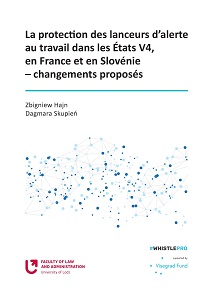
La présente monographie résume les résultats de la recherche réalisée par le groupe internati d’experts en droit dans le cadre de la Bourse de Visegrad (Nr 21930021) intitulée « La protection des lanceurs d’alerte au travail dans les États V4, en France et en Slovénie (WhistlePro) » financée par le Fonds international de Visegrad. Le projet avait pour objectif principal d’étudier la réglementation relative à la protection des personnes qui divulguent les irrégularités et les violations du droit dans des entreprises et dans d’autres institutions privées et publiques dans des États faisant objet de l’étude, ainsi que de montrer les problèmes et de proposer des solutions juridiques liées à la transposition de la directive de l’Union européenne 2019/1937 du 23 octobre 2019 sur la protection des personnes qui signalent des violations du droit de l’Union dans la législation nationale.La publication présente, entre autres, une analyse de l’étendue des questions pouvant faire objet de signalement, de personnes qui peuvent être considérées des lanceurs d’alerte et bénéficier de la protection liée à la divulgation des violations et d’autres entités couvertes par la protection en raison de leur lien avec le lanceur d’alerte, de procédures et canaux internes et externes de signalement des violations de mesures de soutien juridique des lanceurs d’alerte dans leur activité et de leur protection contre les représailles pour divulgation d’informations, de la confidentialité de leur activié, de la responsabilité juridique pour les représailles ou la violation des obligations à l’égard des lanceurs d’alerte.La recherche susvisée a été coordonnée par l’Université de Lodz, la faculté de Droit et d’Administration en coopération avec l’Université Charles à Prague, l’Université de l’Église réformée Gáspár Károli en Hongrie, l’Université de Maribor, l’Université de Tours et l’Université de Trnava à Trnava ainsi qu’avec la participation des représentants d’autres centres scientifiques, institutions publiques, partenaires sociaux, organisations de société civile, entreprises et praticiens du droit.Le résultat global de la recherche réalisée dans le cadre du projet est présenté dans le livre « Towards a Better Protection of Workplace Whistleblowers in the Visegrad Countries, France and Slovenia » publié par la maison d’édition de l’Université de Lodz.Cette publication s’adresse à tous ceux qui s’intéressent aux mesures ayant pour but d’améliorer la situation juridique des personnes qui signalent des violations du droit au travail.The project is co-financed by the Governments of Czechia, Hungary, Poland and Slovakia through Visegrad Grants from International Visegrad Fund. The mission of the Fund is to advance ideas for sustainable regional cooperation in Central Europe.Le projet est cofinancé par les gouvernements de la République tchèque, la Hongrie, la Pologne et la Slovaquie à travers les Bourses de Visegrad du Fonds international de Visegrad. Le Fonds a pour mission de promouvoir des idées en faveur d’une coopérati régionale durable au sein de l’Europe centrale.
More...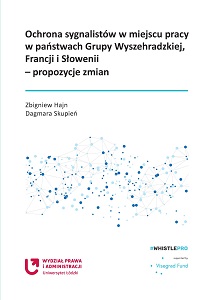
Monografia przedstawia wyniki badań przeprowadzonych przez międzynarodowy zespół ekspertów prawnych w ramach Grantu Wyszehradzkiego (Nr 21930021) nt. „Ochrona sygnalistów w miejscu pracy w państwach Grupy Wyszehradzkiej, Francji i Słowenii (WhistlePro)” finansowanego przez Międzynarodowy Fundusz Wyszehradzki. Głównym celem projektu było zbadanie uregulowania prawnego ochrony osób ujawniających nieprawidłowości i naruszenia prawa w przedsiębiorstwach oraz innych podmiotach prywatnych i publicznych w państwach objętych badaniem, a następnie ukazanie problemów i zaproponowanie rozwiązań prawnych związanych z transpozycją do przepisów krajowych dyrektywy Unii Europejskiej 2019/1937 z 23 października 2019 r. w sprawie ochrony osób zgłaszających naruszenia prawa Unii.Publikacja zawiera między innymi analizę dotyczącą zakresu spraw mogących stanowić przedmiot sygnalizacji, osób, które mogą zostać uznane za sygnalistów i korzystać z ochrony związanej z ujawnianiem naruszeń, a także innych podmiotów objętych ochroną ze względu na powiązanie z sygnalistą, wewnętrznych i zewnętrznych procedur i kanałów sygnalizowania naruszeń, prawnych środków wspierania sygnalistów w ich działaniach, ich ochrony przed odwetem za ujawnianie informacji, zapewnienia poufności tych działań, a także prawnej odpowiedzialności za stosowanie odwetu bądź naruszanie obowiązków wobec sygnalistów.Powyższe badania były koordynowane przez Uniwersytet Łódzki, Wydział Prawa i Administracji we współpracy z Uniwersytetem Karola w Pradze, Uniwersytetem Kościoła Reformowanego im. Gáspára Károliego na Węgrzech, Uniwersytetem w Mariborze, Uniwersytetem w Tours i Uniwersytetem Trnawskim w Trnawie oraz z udziałem przedstawicieli innych ośrodków naukowych, instytucji publicznych, partnerów społecznych, organizacji społeczeństwa obywatelskiego, przedsiębiorstw i praktyków prawa.Pełny obraz badań przeprowadzonych w ramach projektu czytelnicy znajdą w książce pt. „Towards a Better Protection of Workplace Whistleblowers in the Visegrad Countries, France and Slovenia” opublikowanej przez Wydawnictwo Uniwersytetu Łódzkiego.Publikacja adresowana jest do wszystkich zainteresowanych działaniami mającymi na celu poprawę sytuacji prawnej osób sygnalizujących naruszenia prawa w miejscu pracy.
More...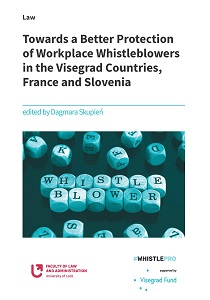
This monograph is an outcome of research completed within the Visegrad Grant “Workplace Whistleblower Protection in the V4 Countries, France and Slovenia” – WhistlePro (2020–2021), financed from the International Visegrad Fund. The project aims to contribute to the improvement of the legal framework in the Visegrad countries concerning the protection of workplace whistleblowers and, indirectly, to the change of workers’ attitudes towards whistleblowing.Contributions prepared by legal experts from various countries and universities concern matters of universal importance such as freedom of expression relative to whistleblowing, personal scope of the EU Whistleblower Protection Directive (2019/1937) or personal data protection. They also discuss the legal situation concerning whistleblower protection in the Visegrad countries, France and Slovenia and present recommendations for changes in the respective countries. The monograph culminates with a summary of proposals for the improvement of the legal situation of persons disclosing breaches of law in the work-related context.Given its topicality and in-depth analysis of legal problems related to adequate whistleblower protection, the book may be of interest to academics, practitioners, social partners, non-governmental organisations (NGOs) and policy makers in the process of the EU Whistleblower Protection Directive transposition in Member States. Dagmara Skupień
More...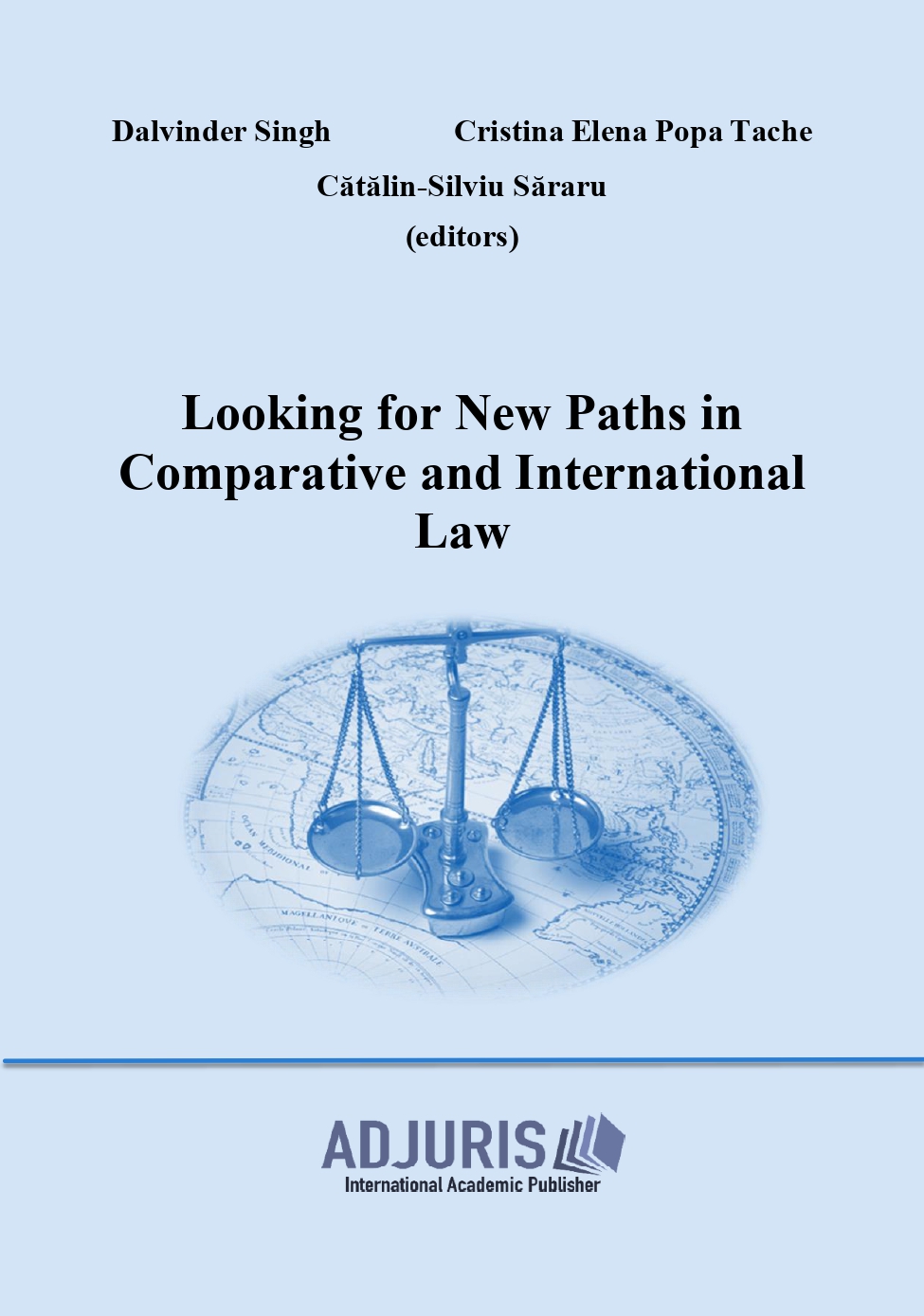
This volume contains the scientific papers presented at the Conference on Comparative and International Law that was held on 25 June 2021 online on Zoom. This is an international conference. The conference is organized every year by the Society of Juridical and Administrative Sciences together with the Faculty of Law of the Bucharest University of Economic Studies. More information about the conference can be found on the official website: www.comparativelawconference.eu . The scientific studies included in this volume are grouped into two chapters: Inspirational analyzes in comparative law, Seeking the brilliance of international law. This volume is aimed at practitioners, researchers, students and PhD. candidates in juridical sciences, who are interested in recent developments and prospects for development in the field of comparative and international law.
More...